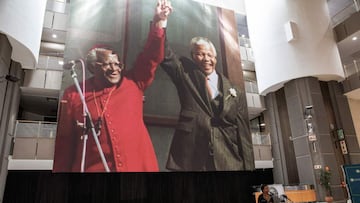Who was Archbishop Desmond Tutu? Religion, relationship with Mandela, fight against apartheid...
Archbishop Desmond Tutu, who was a major activist in the fight to abolish apartheid in South Africa, has died at the age of 90.


Archbishop Desmond Tutu, who was a key figure in the abolition of South Africa’s system of institutionalised racial segregation, known as apartheid, has died at the age of 90.
Tutu a "patriot without equal" - South African President Ramaphosa
In a statement on Sunday, South African President Cyril Ramaphosa described Tutu as a “patriot without equal”, adding that his death is “another chapter of bereavement in our nation’s farewell to a generation of outstanding South Africans who have bequeathed us a liberated South Africa”.
Born on 7 October 1931 in Klerksdorp, South Africa, Tutu was ordained as an Anglican priest in 1960, before serving as Bishop of Lesotho between 1976 and 1978. He was then named Bishop of Johannesburg in 1985, before his appointment as Archbishop of Cape Town the following year. Tutu remained in the role until 1996.
Together with Nelson Mandela, who spent his first night after his 1990 release from prison at Tutu’s home, he was one of the major faces of the struggle against apartheid, which lasted from 1948 until 1991. Three years after its end, Mandela became South Africa's first black president following the country's first multiracial elections.
The passing of Archbishop Emeritus Desmond Tutu is another chapter of bereavement in our nation’s farewell to a generation of outstanding South Africans who have bequeathed us a liberated South Africa. pic.twitter.com/vjzFb3QrNZ
— Cyril Ramaphosa 🇿🇦 (@CyrilRamaphosa) December 26, 2021
Awarded Nobel Peace Prize for anti-apartheid activism
Tutu spoke out vehemently against apartheid, describing it in a 1985 United Nations address as a “vicious, evil, totally immoral policy comparable in its viciousness to the Aryan madness of Nazism”.
A year earlier, Tutu was awarded the Nobel Peace Prize for his anti-apartheid activism, with the Nobel Committee praising his “role as a unifying leader figure in the non-violent campaign to resolve the problem”.
In 1995, Mandela appointed the bishop to a Truth and Reconciliation Commission, which was tasked with collecting evidence on apartheid-era crimes.
Mandela Foundation pays tribute to "extraordinary" Tutu
The Nelson Mandela Foundation on Sunday described Tutu's death as an "immeasurable" loss. "He was larger than life, and for so many in South Africa and around the world his life has been a blessing," a statement read.
"His contributions to struggles against injustice, locally and globally, are matched only by the depth of his thinking about the making of liberatory futures for human societies. He was an extraordinary human being. A thinker. A leader. A shepherd."
The @NelsonMandela Foundation is saddened to hear of the passing of Archbishop Emeritus Desmond Tutu. This loss is immeasurable. Our deepest condolences go out to Mam Leah and the Tutu family.
— NelsonMandela (@NelsonMandela) December 26, 2021
Full statement: https://t.co/rET7kevXjf pic.twitter.com/f3hZ5j2CLh
Related stories
Tutu is credited with coining the term ‘rainbow nation’ to describe post-apartheid South Africa.
His death follows that of FW de Klerk, South Africa’s last apartheid president, who passed away at the age of 85 in November.